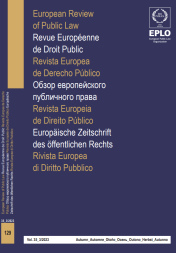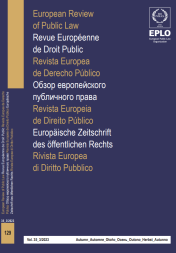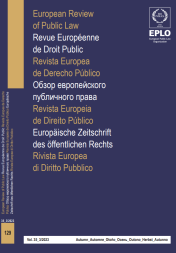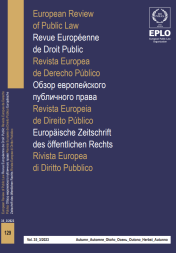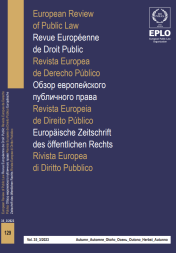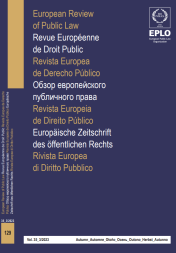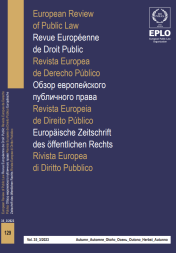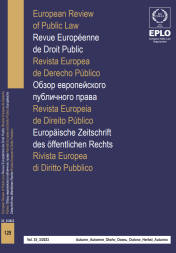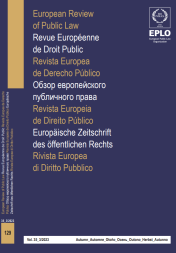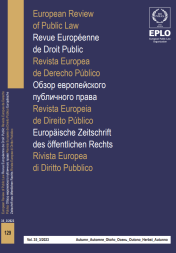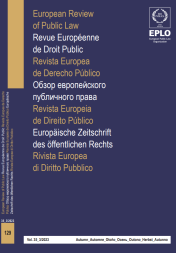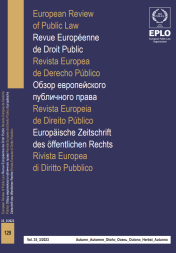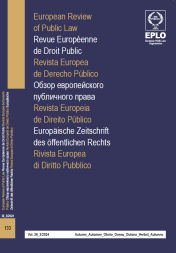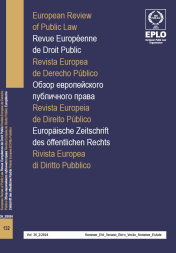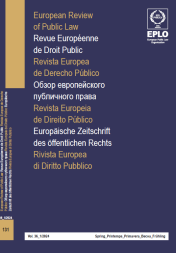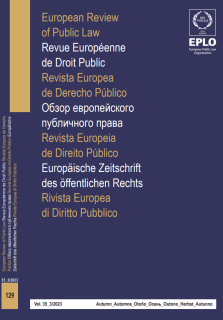
ERPL
Vol. 35, no 3, autumn/automne 2023 (129)
This issue reaffirms the ERPL’s commitment to provide and enrich scientific research on topical matters covering different jurisdictions.
In this context, the first article describes the Danish model for impeachment of ministers: The Impeachment Court, and it asks the question whether such an institution has become outdated. Even though States seem increasingly to abandon the use of impeachment courts, whether de jure or de facto, Denmark has seen a kind of “revival” of the Impeachment Court, which for long was considered obsolete. However, the similarities between the two most recent Danish cases indicate that the “system” learns little from impeachment cases. On this background, the article considers viable alternatives to Impeachment Courts when ministers need to be held accountable.
The next article tries to clarify whether art. 8 of the ECHR can guarantee preventive protection for the victims of the crime of ill-treatment against family members and cohabitants, governed by art. 572 of the Italian Penal Code. The problem is that delays after the report has been made by the victim until the criminal process can begin, allow the violent family member to trigger a spiral of acts of violence in increasing succession, exposing the other family members to very serious consequences. A law would be appropriate to allow the police, on the order of the judge, to issue preventive and precautionary measures, quick and effective, in order to prevent these facts, rather than intervening only following the death or injury of the victims.
The third article provides an analysis of metropolitan tasks in Polish and French legal order and attempts to categorise them. The results of metropolis analysis in the functional approach indicate the differentiation of French metropolitan structures which can contribute to a new structure of the metropolis institution in Polish legal order, based on the categorisation of metropolises (from cooperation between municipalities, through metropolitan unions in the current legal form, to the metropolises with legal government status such as the Metropolis of Lyon). Thus, the paper provides substantial arguments for a broader, more inclusive discussion on metropolises in the functional approach and decentralisation of public tasks.
Last but not least, the final article in this section deals with major societal morals relating to individual human rights that require recognition of enumerated and unenumerated rights either in a Constitutional document and/or by means of Statute. The paper seeks to examine the historical development of natural law, providing an overview of advancements in light of moral considerations in order to make an accurate statement as to whether the European Union continues to use legislative instruments to enforce their moral ideals on their respective societes. To this end, Finnis's seven basic goods for ordering human life and human community theorems act as a benchmark for providing analytical observations. Thereby, the article demonstrates the continued use of natural law legal mechanisms by government to regulate major societal behaviour and morals, concluding that this power to regulate is not unfettered.
In the section of Chronicles of Constitutional Law, the first part of the chronicle coming from Slovakia looks at two constitutional amendments passed by the parliament in 2023, that allowed the parliament to call for early parliamentary election and introduced the right to pay in cash for the purchase of goods and services. The second part analyzes the constitutional impact of a successful no confidence vote in parliament in December 2022, that forced the President to appoint a “temporary” cabinet with limited powers under her control.
The chronicle on the Constitutional Law of Ukraine on the year 2022, which will undoubtedly go down as one of the most challenging in the history of Ukraine, if not the most challenging, owing to the Russian Federation’s aggression against the country, reveals trends in municipal law, human rights protection activities, and the promotion of European standards implementation, as set by the Council of Europe. This chronicle illustrates how societal and legislative changes impact constitutional doctrine, inspiring constitutionalists to explore the potential role of local and regional authorities in implementing ECtHR judgments.
The first paper in the section of Chronicles of Administrative Law examines the various interesting developments that Belgian administrative law experienced in 2022, which have affected both the internal and external organisation of federal, regional, community and local administrations. Among other things, changes relate to the possibility of holding deliberations remotely and authorising teleworking, as well as the obligation for the district mayor and deputies to provide a list of mandates, functions and professions. Several simplifications have also been made to the status of civil servants in certain public services. The courts, for their part, have issued rulings clarifying certain aspects of the system of disciplinary sanctions and specifying the obligations relating to the duty of loyalty and reserve of civil servants. Various current events, including the consequences of the COVID-19 pandemic, the repercussions of the war in Ukraine, the effects of the significant floods in July 2021, the challenges posed by the energy crisis and the increasing adoption of digital technologies, have also influenced Administrative life. It should also be noted that 2022 marks the launch of a major project to reform the Council of State to make the procedure more efficient and reduce the existing backlog of cases.
The second Administrative Law chronicle, coming from Portugal, provides an overview of the amendments Decree-Law 11/2023 and Decree-Law 87/2023 have introduced to the environmental licensing scenario in Portugal. Are addressed the amendments to (i) the Legal Framework for Environmental Impact Assessment and related legislation; (ii) the Integrated Pollution Prevention and Control Framework; (iii) the Water Law; (iv) the Use of Water Resources Framework; (v) the Administrative Procedure Code and (vi) Decree-Law 135/99. It also looks into the most relevant changes Decree-Law 74-B/2023 has made to the Statutes of the Administrative and Tax Courts.
A chronicle on the Ukrainian Administrative Law follows, which analyzes the development of the current state of Ukraine in the field of waste management. The author determines that the implementation of hazardous waste management in Ukraine was characterized by a low level of efficiency even at the time of the full-scale invasion and identifies the reasons. Although strategies are adopted in the field, the problem of using hazardous waste in Ukraine requires a review of approaches to establishing a regime for their handling, utilization and prevention of formation. The chronicle maintains that, in accordance with the established requirements of the Agreement on the Association of Ukraine with the European Union, it is necessary at the level of a special legislative act to determine the specifics of the use of hazardous (industrial) waste and the normative basis for the classification of hazardous waste according to the degree of their ecological danger, to establish a special order and the basis for the application of legal measures for violation or improper implementation of such regime provisions.
Last but not least in the section of Administrative Law chronicles, the next chronicle tracks important developments in Administrative Law in the United Kingdom in 2022. The theme which unites the cases considered therein is their treatment of claims regarding the presence of constitutional principles in the common law. The recent decisions of the UK Supreme Court in R (O and Project for Registration of Children as British Citizens) v Home Secretary and R (Coughlan) v Cabinet Office and Craig v Her Majesty’s Advocate raise important issues about the principle of legality, the right to citizenship, and the right to vote, as well as the constitutional principle of trust. In the Court of Appeal, the decision of D4 v Home Secretary reaffirms the right to notice as a central feature of the common law in the context of deprivation of citizenship. The discussion begins with a consideration of the principle of legality. Section 2 considers how the constitutional principle of trust mediates the relationship between the executive and public law remedies. Finally, section 3 considers the importance of the right to notice as a wider subset of fair procedures.
Going on to the section of Jurisprudence, the chronicle on Portuguese Constitutional Jurisprudence gives an overview of the Portuguese Constitutional Court case law of 2022. In this year, the Court issued an important decision regarding the Covid-19 pandemic. Besides this ruling, the Court faced relevant challenges in different fields of the Portuguese legal framework. As usual, Criminal and Tax Law stood out as the main legal areas approached by the Portuguese Constitutional Court. There were also thought-provoking Rulings on the legal upper age limit in adoption proceedings and rules concerning publicity of “assisted adults” proceedings. All of this is reflected in the decisions summarized in the chronicle.
This ERPL issue is concluded by the section of Book Reviews, in which two chronicles reviewing some of the most important publications in Austria and in Ukraine respectively in the field of Public Law are published.
Summary
Articles
J.E. Rytter, The Danish Impeachment Court – An Outdated Institution? [IN ENGLISH] (10 pp.)
A. Corsale, The Right to Private and Family Life under the Italian Jurisprudence: The Domestic Violence [IN ENGLISH] (15 pp.)
M. Augustyniak, Metropolises in Poland and France – A Functional Approach [IN ENGLISH] (17 pp.)
D. Cookman, To What Extent Should Law Be Used to Enforce the Moral Values of a Society? [IN ENGLISH] (40 pp.)
Chronicles
I. Constitutional Law
E. Láštic, Slovakia [IN ENGLISH] (7 pp.)
N. V. Mishyna, Ukraine [IN ENGLISH] (15 pp.)
II. Administrative Law
D. Renders / G. Dresse / E. Taylor, Belgium [IN FRENCH] (51 pp.)
A. Choon / M. Viana Pedreira, Portugal [IN ENGLISH] (18 pp.)
Yu. Leheza, Ukraine [IN ENGLISH] (17 pp.)
H. J. Hooper, United Kingdom / Royaume-Uni [IN ENGLISH] (28 pp.)
II. Jurisprudence
A. M. Abrantes / C. Gouveia Alves / N. de Lemos Jorge, Constitutional Jurisprudence, Portugal [IN ENGLISH] (40 pp.)
Book Reviews
B. Leitl-Staudinger [IN GERMAN] (4 pp.)
Z. A. Ivantsova [IN GERMAN] (14 pp.)















